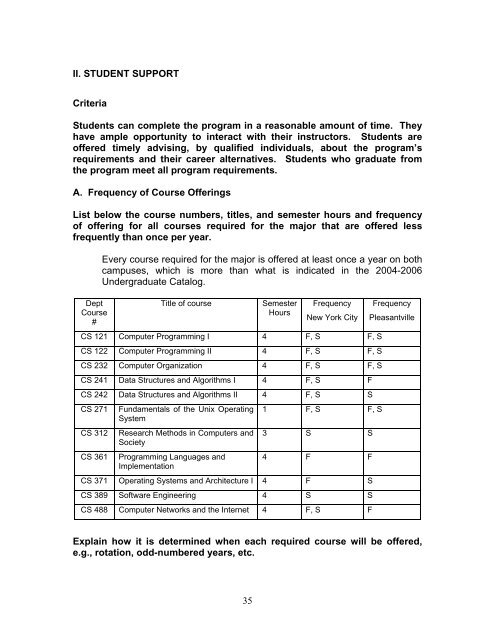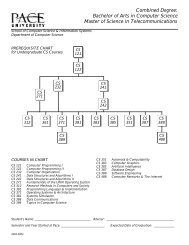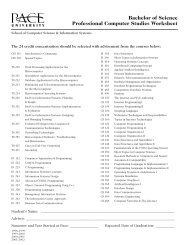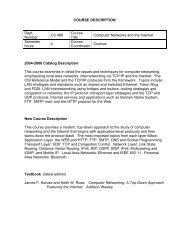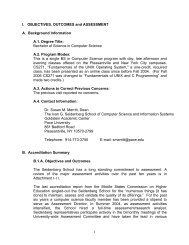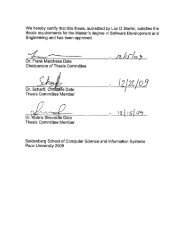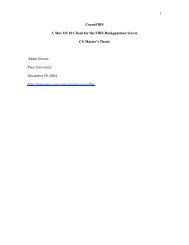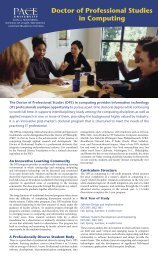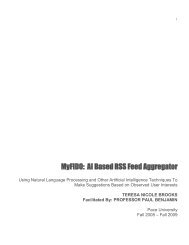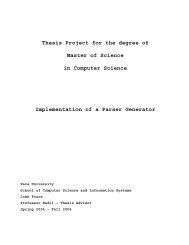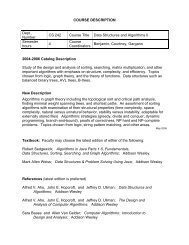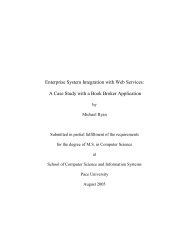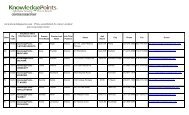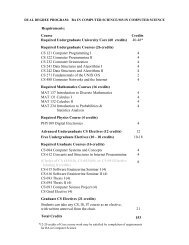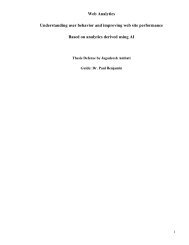35 II. STUDENT SUPPORT Criteria Students can ... - pace university
35 II. STUDENT SUPPORT Criteria Students can ... - pace university
35 II. STUDENT SUPPORT Criteria Students can ... - pace university
Create successful ePaper yourself
Turn your PDF publications into a flip-book with our unique Google optimized e-Paper software.
<strong>II</strong>. <strong>STUDENT</strong> <strong>SUPPORT</strong><br />
<strong>Criteria</strong><br />
<strong>Students</strong> <strong>can</strong> complete the program in a reasonable amount of time. They<br />
have ample opportunity to interact with their instructors. <strong>Students</strong> are<br />
offered timely advising, by qualified individuals, about the program’s<br />
requirements and their career alternatives. <strong>Students</strong> who graduate from<br />
the program meet all program requirements.<br />
A. Frequency of Course Offerings<br />
List below the course numbers, titles, and semester hours and frequency<br />
of offering for all courses required for the major that are offered less<br />
frequently than once per year.<br />
Dept<br />
Course<br />
#<br />
Every course required for the major is offered at least once a year on both<br />
campuses, which is more than what is indicated in the 2004-2006<br />
Undergraduate Catalog.<br />
Title of course Semester<br />
Hours<br />
<strong>35</strong><br />
Frequency<br />
New York City<br />
CS 121 Computer Programming I 4 F, S F, S<br />
CS 122 Computer Programming <strong>II</strong> 4 F, S F, S<br />
CS 232 Computer Organization 4 F, S F, S<br />
CS 241 Data Structures and Algorithms I 4 F, S F<br />
CS 242 Data Structures and Algorithms <strong>II</strong> 4 F, S S<br />
CS 271 Fundamentals of the Unix Operating<br />
System<br />
1 F, S F, S<br />
CS 312 Research Methods in Computers and<br />
Society<br />
CS 361 Programming Languages and<br />
Implementation<br />
3 S S<br />
4 F F<br />
CS 371 Operating Systems and Architecture I 4 F S<br />
CS 389 Software Engineering 4 S S<br />
CS 488 Computer Networks and the Internet 4 F, S F<br />
Frequency<br />
Pleasantville<br />
Explain how it is determined when each required course will be offered,<br />
e.g., rotation, odd-numbered years, etc.
The guiding consideration is that a full-time student who begins the<br />
program with CS 121 in the fall semester of the sophomore year should be<br />
able to complete the program’s requirements by the close of the spring<br />
semester of the senior (the fourth) year.<br />
In times of strong enrollments core courses are often offered every<br />
semester. In times of lean enrollments core courses are offered at least<br />
once a year. The upper level required courses are offered at least once a<br />
year. This is known by faculty and advisors to insure appropriate<br />
advisement. As one program spanning two campuses there is no<br />
restriction on the location at which any course may be taken; students <strong>can</strong><br />
easily enroll in courses on either or both campuses. However, students<br />
typically take all the courses they need on their home campus unless they<br />
chose to do otherwise.<br />
2. List below the course numbers, titles, and semester hours of courses<br />
allowed for the major but not required (i.e., either free electives or lists of<br />
courses from which students must choose a certain number), and explain<br />
how it is determined when they will be offered.<br />
Dept<br />
Course<br />
#<br />
Title of course Semester<br />
Hours<br />
36<br />
Frequency<br />
New York City<br />
CS 301 Computer Science Internship 3 TBA TBA<br />
CS <strong>35</strong>1 Automata and Computability 4 TBA TBA<br />
CS 383 Computer Graphics 4 F F<br />
CS 385 Artificial Intelligence 4 S F<br />
CS 387 Database Design 4 F, S F, S<br />
CS 388 Data Communications 4 F, S F<br />
CS 396* Special Topics in Computer<br />
Science (topics vary)<br />
variable F, S F, S<br />
CS 490** Independent Study in Computer<br />
Science I<br />
variable F, S F, S<br />
Frequency<br />
Pleasantville<br />
* The Computer Science Department offers courses on a wide range of<br />
contemporary topics to allow students to focus on issues of current<br />
professional interest. The special topics include: computer and data<br />
security, implementing client/server infrastructure, software metrics,<br />
servlets and databases, pattern recognition, just to name a few.<br />
** This course is offered only by special arrangement between the student,<br />
the faculty member, and the Computer Science Department Chairperson.
B. Interaction with Faculty<br />
1. Describe how you achieve effective interaction between students and<br />
faculty.<br />
Course enrollments are kept small. While courses are capped at 30,<br />
average class sizes are substantially less. The average class size for the<br />
Computer Science courses in Spring 2006 was 12 students.<br />
The culture of the program fosters high faculty availability to students and<br />
an easiness that removes blockages to communication. Email has made<br />
communication easier than ever before with the effect that: students who<br />
get stuck in their homework do not stay stuck, engagement is<br />
strengthened, and the sense of community cohesion shared by students<br />
and faculty is more pronounced than ever before. Blackboard, our Internet<br />
based courseware, is an ever available repository of course materials<br />
including the syllabus. In addition, it allows the instructor to post<br />
announcements of special signifi<strong>can</strong>ce such as changes in assignments<br />
or class contacts, as well as co-curricular special programs and speakers.<br />
Faculty are also required to have at least 5 hours of on-campus office<br />
hours each week and many are available much more than that.<br />
Easiness between students and faculty is cultivated by a variety of events.<br />
At the beginning of each semester, a Welcome Party on each campus<br />
allows students and faculty an opportunity to meet each other or get<br />
reacquainted. Other events fostering interaction include an annual softball<br />
game in Pleasantville and frequent pizza parties. A telling indicator of high<br />
cohesion is that students in Computer Science to a large extent (93.3%)<br />
felt that the faculty was “on their side.” (Student Opinion Survey 2005, item<br />
23 - Attachment I-5)<br />
C. Student Advising<br />
1. Describe your system of advisement for students on how to complete<br />
the program. Indicate how you ensure that such advisement is available to<br />
all students.<br />
Student advisement is managed by the school-based Academic Advisors<br />
and supplemented by the faculty. Prior to registration each semester, a<br />
“hold” is placed on each CS student’s registration and is not removed until<br />
there is written notification that advisement has taken place. The<br />
academic advisor, who has access to students' records online, oversees<br />
compliance with the University Core, the requirements for the BS in CS,<br />
and more general University stipulations (e.g. 128 credits to graduate,<br />
filing the application for graduation). The advisor actively assists students<br />
37
with policies and procedures involving all kinds of matters, from study<br />
abroad opportunities to the administrative task of registering for a minor.<br />
<strong>Students</strong> are encouraged to meet with a faculty member for advisement<br />
and mentoring each semester. CS faculty are helpful in conjunction with<br />
selecting CS electives, offering perspectives on the curriculum and how it<br />
relates to the particular interests of students, and recommending special<br />
studying a student might do to develop interests that extend or straddle<br />
courses and that might relate to a career goal. Each faculty member is<br />
expected to keep five office hours a week throughout the semester. Office<br />
hours are communicated to students in three ways: a faculty member's<br />
hours are posted on the door of the office, they are often printed on course<br />
outlines, and a directory of office hours, office locations, and email<br />
addresses is also available online at the following link:<br />
http://appserv.<strong>pace</strong>.edu/execute/page.cfm?doc_id=18925 and elsewhere.<br />
A list of faculty office hours are also sent to the students in anticipation of<br />
the two week advisement period just prior to registration. Although<br />
students are required to seek academic advising each term, students are<br />
not assigned to faculty members for advising; they are free to meet with<br />
the faculty member or members of their choice. The faculty advisor a<br />
student chooses <strong>can</strong> change from term to term as students develop<br />
specialized interests and a rapport with an expanded set of faculty.<br />
The school-based academic advisors are available on a walk-in basis as<br />
well as by appointment. During the pre-registration period their availability<br />
is extended as are the office hours of faculty.<br />
2. When students need to make course decisions and career choices, what<br />
is their procedure for obtaining advising? Do they have adequate access<br />
to qualified professionals when necessary?<br />
Every semester, students are sent a registration packet that includes a<br />
listing of all faculty and their office hours as well as advisement<br />
procedures (Attachment <strong>II</strong>-1). Faculty are available by appointment,<br />
without appointment during office hours, and informally at odd times at<br />
their discretion (e.g. after class). Likewise for the academic advisor and<br />
the associate dean on each campus. The University handles official<br />
course selection online. <strong>Students</strong>, based on seniority, are assigned a day<br />
and time via e-mail from the Office of Student Assistance (OSA) after<br />
which they may register for classes for the upcoming semester. <strong>Students</strong><br />
discuss internship possibilities, career possibilities, and graduate school<br />
with faculty members on a continuing basis.<br />
38
Career counseling is offered by the staff at the offices of Cooperative<br />
Education and Career Services. There is an office on the New York City<br />
campus and another at the Pleasantville campus. <strong>Students</strong> are offered<br />
formal workshops and individual counseling on resume writing,<br />
interviewing skills, and on the range of opportunities available. In addition,<br />
Co-op and Career Services maintains a Website with a tremendous<br />
amount of useful information and job openings:<br />
http://appserv.<strong>pace</strong>.edu/execute/page.cfm?doc_id=1395<br />
D. Meeting the Requirements<br />
1. Describe your standards and procedures for ensuring that graduates<br />
meet all of the requirements of the program.<br />
All students have a worksheet outlining the requirements for graduation.<br />
The students and advisors use these worksheets and keep them up-todate<br />
during every advisement session. During the start of their senior<br />
year, students must register their intent to graduate by filing the prescribed<br />
form (Attachment <strong>II</strong>-2) with the Office of Student Assistance (OSA). This<br />
will initiate the generation of an audit, completed by that office, to<br />
determine that each requirement on the student's worksheet is properly<br />
fulfilled. The result of this audit is reported to the student in a letter sent by<br />
mail.<br />
If any requirement for the degree as specified by the worksheet appears<br />
unfulfilled, the student is directed to meet with the Academic Advisor in the<br />
Seidenberg School. Generally a schedule is planned with the student that<br />
will enable completion of missing requirement(s) in the most expeditious<br />
manner. If a waiver/substitution is to be made, the appropriate paperwork<br />
is completed and filed with the Office of Student Assistance (Attachment<br />
<strong>II</strong>-3). If the school-based advisement office disagrees with the result of<br />
the audit, the advisor or associate dean handles the matter with the Office<br />
of Student Assistance and a revised determination is issued.<br />
39


